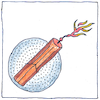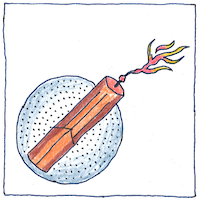Chinese, Tang Dynasty
chemistry

|
Gunpowder
Taoist monks or alchemists in China combined sulfur and charcoal as a medicine. Searching for the elixer of immortality, they added saltpeter, creating gunpowder, the first chemical explosive and propellant. They used gunpowder at first for its incendiary effects, and were gradually able to increase the saltpeter to make it more explosive and more useful in weaponry.
Devices
Simple incendiary sticks threw out a purple flame. Flamethrower tubes emitting burning gas and embers. Fire lances lighted and thrown at the enemy. Fire grenades. Fire birds. Thunder-clap bombs. Ceramic-shelled grenades thrown by hand to explode among enemy soldiers. Bombs that blind, burn, and poison; bombs that kill with shrapnel. Land mines with a long fuse lit by ambushers at a distance. A string of land mines triggered by a trip wire. Naval mines with delayed fuses and fancy trigger mechanisms. Fire and explosive bombs launched by trebuchet. A proto cannon, the Eruptor, that fired cast-iron shells filled with gunpowder. Fire arrows launched from bows and crossbows Fire arrows partially propelled by their own exhaust.
Mortality
If the powder scared away evil spirits and brought good luck at first, it also scared away human spirits and brought death. An elixer of immortality also a mortal poison.
State secrets
An advantage that depends on secrecy is only temporary. If you use it then everyone knows about it. Because many people have to know something about it, “state secret” is an oxymoron. Suppose a nation abolished secrecy. It would not only need to give up concealing but behave so they have nothing to conceal. Suppose a nation declared it would have no secrecy. Suppose true democracy were possible.



The recipe for gunpowder was a state secret, and trade in nitrous raw materials was restricted. The Mongols conquered to obtain it. Around 1376, the Korean Choe Mu-seon bribed a Chinese merchant to get the formula, and figured how to extract potassium nitrate from soils.
See also in The book of science:
Readings in wikipedia: